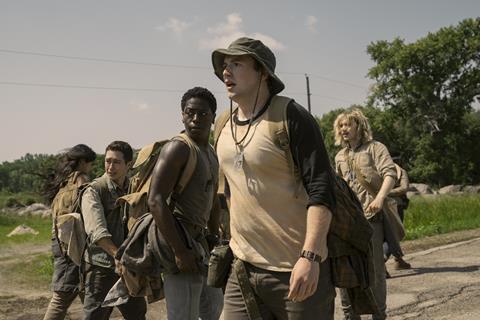Francis Lawrence directs uncompromising survival horror starring David Jonsson, Cooper Hoffman and Charlie Plummer

Dir: Francis Lawrence. US. 2025. 108mins
This adaptation of a 1979 novel by Stephen King (published under the pseudonym Richard Bachman) comes hot on the heels of another big-screen King feature, The Life Of Chuck. While both confront issues of mortality and death – King’s greatest preoccupations – The Long Walk has nothing of Chuck’s colour, whimsy or optimism. This tale of 50 young men pitted against each other in a twisted survival of the fittest is presented as a washed-out dystopian nightmare; unrelentingly bleak and utterly brutal, it’s one of the most powerful King features for some time.
A poignant emotional heart which powers it through mile after trudging mile
The Long Walk has been a long time coming, with various directors including George A. Romero, Frank Darabont and James Vanderbilt having been attached over the last 30 years. Finally bringing it to the screen is Francis Lawrence, best known for helming most of The Hunger Games movies, with which this shares thematic similarities. The Long Walk is decidedly more adult than that YA franchise, however, and follows in the uncompromising vein of films like Series 7: The Contenders (2001) and The Hunt (2020). Audiences are likely to be attracted by the source material and cast which includes Cooper Hoffman, David Jonsson and Charlie Plummer and – as with recent allegorical horror Weapons – strong word of mouth could give it serious legs when it rolls out globally from September 11.
In a dystopian America driven to the brink of economic and social collapse by an unnamed (possibly civil) war 19 years earlier, a group of 50 young men gathers to partake in ‘The Long Walk’. This annual televised event is a trek of indeterminate length through America’s devastated heartland (although the film shot in Winnipeg). Participants are chosen from across the country by lottery and the winner will receive a life-changing cash sum and a single wish; the somewhat nonsensical goal is to inspire the American public to work hard, dream big and rebuild the nation.
This isn’t a simple stroll, however; all walkers must maintain a speed of three miles-an-hour (reduced from the book’s four). If their pace slows, for whatever reason, they get a warning and 10 seconds to speed up (again, reduced from the book’s 30 seconds). Three such warnings and they get shot in the head. If they attempt to run, they get shot in the head. The winner is the last one walking.
There is absolutely no mercy shown to the walkers, who are not allowed to stop for sleep, to use the bathroom or if they are injured, and screenwriter JT Mollner’s largely-faithful adaptation leans into the cruel hopelessness of King’s vision. The walkers are stripped of their names and given numbers worn on dogtags around their necks, and we only get to know a handful of them including jittery local boy Raymond Garraty (Cooper Hoffman); calm, upbeat Peter (a particularly excellent David Jonsson); religious man Arthur (Tut Nyuot); wisecracking Hank (Ben Wang); enigmatic Stebbins (Garrett Wareing) and bullish Barkovitch (Charlie Plummer).
These few diverse speaking characters are strongly drawn and their camaraderie turns to support and even friendship, giving the film a poignant emotional heart which powers it through mile after trudging mile. Yet it’s always shot through with the melancholic understanding that none of these new bonds can last. Ultimately, it’s every man for himself.
King wrote this story while at college in the mid 1960s, at a time when the optimism of the youth movement was being pummelled by the everyday horrors of the Vietnam War. While that’s an obvious influence for this story of young men being marched to their inevitable death by an uncaring military, led by the gruff, callous Major (a decidedly Trump-esque Mark Hamill), there are also equally-as-obvious parallels to be drawn with today’s political climate. Ideas of radicalism, fascism, isolationism and capitalism could all be said to fuel this long walk, which carves a path through an America that is both recognisable and forever changed.
Cinematographer Jo Willem’s steady, carefully-choreographed camera stays with the group, observing them en mass or as individuals, and only occasionally looks away to observe the flat, blanched landscape, the blank stares of the locals. As the miles and days pass (indicated via on screen captions), and spirits and psyches begin to fracture, this intense focus becomes claustrophobic – you can well understand why some of the walkers have an urge to break away, despite the lethal consequences. Killings remain shocking and unflinching; there’s no coyness here, nor in the haunting, bruising score from The Lumineer’s co-founder Jeremiah Fraites. And while the film changes the ending of the novel, losing some of its ambiguity in the process, its gut-punch impact remains just as strong.
Production companies: Vertigo Entertainment, about:blank
International sales: Lionsgate
Producers: Francis Lawrence, Roy Lee, Cameron MacConomy, Steven Schneider
Screenplay: JT Mollner, from the novel by Stephen King
Cinematography: Jo Willem
Production design: Nicholas Lepage
Editing: Peggy Eghbalian, Mark Yoshikawa
Music: Jeremiah Fraites
Main cast: Cooper Hoffman, David Jonsson, Garrett Wareing, Tut Nyuot, Charlie Plummer, Ben Wang, Roman Griffin Davis, Jordan Gonzalez, Joshua Odjick, Josh Hamilton, Judy Greer, Mark Hamil
























